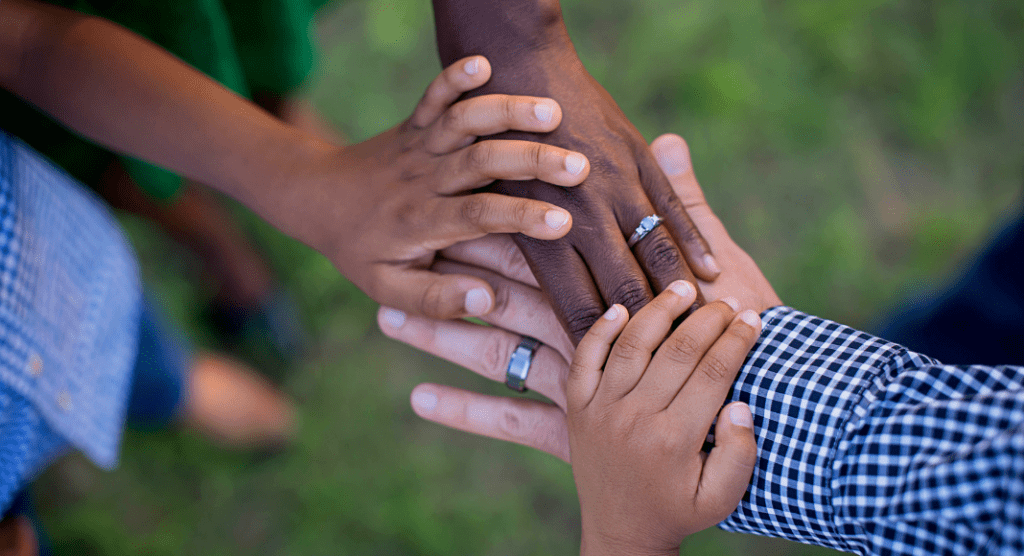
*Consciously Coupled* explores everything relationships from local moms AND a licensed couples counselor. We’re discussing couples therapy, the pros and cons of relationship books, tips on navigating cross-cultural relationships, how to find time alone as a couple, and MUCH MORE! See the entire series here.
Before we had children, the question of when we would celebrate Christmas had been somewhat of a facetiously contentious point.
- In my family, we would attend midnight Mass on Christmas Eve, come home, and open gifts late into the night. Then on Christmas Day, we’d spend the day with extended family.
- My husband’s family would open one gift on Christmas Eve and then open the rest of Christmas morning.
After we got married, we celebrated Christmas with each other’s families and followed their lead. However, this subtle but significant cultural difference brought to light that we had some things to discuss.
My husband and I have been married for 12 years. When we were dating, the subject of culture came up a lot. He’s Black; I’m a second-generation Filipino-American. I was raised Catholic, he comes from a Baptist upbringing. I’m from California. He’s from the South. I lived in one house most of my life. He was an Army brat who moved regularly.
We had a lot of cultural differences, to say the least.
 Differences in culture can run the gamut of interpretations. It can include your ethnicity, nationality, religion, geographical location, education, age, and/or socio-economic factors.
Differences in culture can run the gamut of interpretations. It can include your ethnicity, nationality, religion, geographical location, education, age, and/or socio-economic factors.
When you come together in a relationship, it’s important to take each other’s cultures into consideration. It definitely makes life a lot more interesting!
5 Tips for Navigating Cultural Differences in Relationships
1. Lead with Curiosity about Cultural Differences
When you come from two (or more) different cultures, it’s important to explore and learn more about them. Curiosity regarding each other’s cultures can go a long way.
It can be as simple as talking to each other about your childhood and holiday traditions. What traditions were significant when you were a child? What are the traditions that you want to carry on into your family together?
It’s asking questions about things that you’ve wondered about but maybe have never asked. It’s participating in family events and asking for the rundown so that you know what to expect.
You don’t have to become an expert in each other’s cultures, and it’s great to develop a love and appreciation for where you each come from, whether that’s a large Irish family or a small close-knit Korean family.
2. Make an Effort to Learn About Each Other’s Cultures
Along the same vein, make an effort to celebrate each other’s cultures. Show each other that you care by trying to make a traditional meal (even if it flops!), learn some phrases in their native tongue, or pick up a book to learn more.
On our first New Year’s Day as a married couple, I made an effort to cook greens, black-eyed peas, and rice, as was tradition in my husband’s family. I don’t know how well they turned out that first year, but I tried!
When a new Filipino restaurant opened nearby several years ago, my husband planned a date night for us to go and try it out. He wasn’t familiar with the food, but he was willing to try and I loved that he made the effort.
Some of the simplest ways to learn about each other’s cultures include:
- Try each other’s native foods…easy date-night decision!
- Learn how to say simple phrases in your partner’s home language to greet their family at gatherings.
- Watch a movie or TV show without the English dubbing.
3. Incorporate Cultural Traditions
This might look like traditions of how you pray, how you celebrate, or how you entertain.
When my husband and I got married, we had to decide how we would incorporate our cultures into the ceremony. I was raised Catholic, so we got married in a Catholic church. My husband was raised Baptist, so we didn’t have a full Mass. We did have the traditional Filipino custom of the cord, veil, and coins. At the end of the ceremony, we jumped the broom.
Before kids, we talked about names and we decided together that we’d give them “C” names since both of our names start with the letter C. It was also a subtle nod to a Filipino tradition of naming your kids with the same first initial. When our kids were born, we followed a common Filipino naming convention of including my maiden name in their full official name.
 4. Be Flexible & Release Expectations
4. Be Flexible & Release Expectations
I think as humans we have a natural tendency to expect things to go according to our own expectations. We may expect to celebrate holidays a certain way, clean the house on a particular day, or assume specific household roles. However, when you blend two different cultures together, it’s important to clear your expectations and set some new ones together.
You may have “always” celebrated an occasion a certain way. But now that you’re married or have children, it’s important to take your partner’s thoughts and feelings into consideration. Be open to creating new “rules” for your family.
Teach your kids how your family takes off shoes before entering a home, changes out of work/school clothes into play clothes when arriving at home, or how you eat rice with most meals.
For example, growing up in California, using “sir” and “ma’am” was not part of the vernacular. My husband, on the other hand, grew up mostly in the South and he ALWAYS says “sir” and “ma’am” as signs of respect. I’ve conceded that our children will learn to say “sir” and “ma’am”, especially as they are growing up in Texas.
5. Create Your Own Cultural Traditions
This is probably the most fun part of being in a cross-cultural relationship. You make the rules and you create the traditions!
In our family, we celebrate Loving Day on June 12, which is the anniversary of a historic Supreme Court case that legalized interracial marriage. Right now, while our kids are still little, it’s mostly an observance of the day. I think once they are older and understand what the day signifies we will celebrate in a bigger way. June 12 also happens to be Philippine Independence Day, when the Philippines was declared independent from Spain.
Having spent some of my childhood years in France, I’d like to teach my children about Pere Noel and leaving your shoes out, Galette des Rois for Three Kings (totally different from King Cake!), and La Fete Nationale on July 14.
I think it’s important to incorporate your cultures into your family to pass down to the next generation. I definitely want my kids to know about Juneteenth and what “jumping the broom” is, learn Tagalog words and phrases, and know where they come from.
At the end of the day, it’s all about empathy and appreciating each other for who we are, and teaching our children to do the same.













